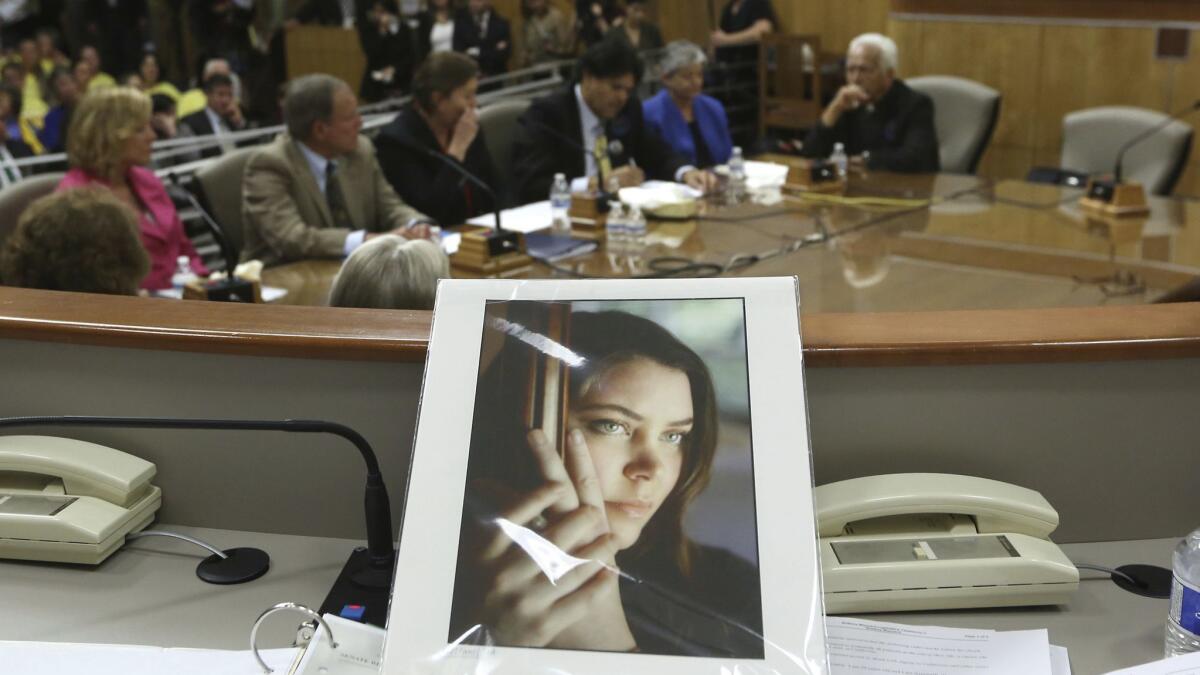California’s physician-assisted suicide law is overturned — for now

- Share via
Nearly two years after it was enacted, California’s physician-assisted suicide law is, at least for the moment, no longer in effect.
A Riverside County judge who ruled against the law last week issued a formal judgment Friday deeming it unconstitutional. Legal experts said that meant the law had been overturned.
The law allowed patients who are terminally ill to request life-ending medications from their doctors. In the first six months it was in effect, more than 100 Californians, most of them suffering from cancer, used it to take their lives.
Supporters of the law say they hope they’ll be able to keep the law in place by appealing Riverside County Superior Court Judge Daniel A. Ottolia’s decision, but it is unclear if or when that might happen.
“It is a bit of a mess,” said Kathryn Tucker, an attorney who heads the End of Life Liberty Project at UCSF/UC Hastings Consortium on Law, Science & Health Policy.
What’s happened so far?
Opponents of the End of Life Option Act filed a lawsuit hoping to overturn the law on the day it took effect in 2016.
On May 15 this year, Ottolia ruled that the law was unconstitutional because the California Legislature had passed the bill during a special session dedicated to healthcare issues. He ordered the law voided, but the decision did not immediately take effect.
The aid-in-dying legislation was approved in 2015 and made the state the fifth in the nation to legalize the practice. When Gov. Jerry Brown signed the law, he said he imagined that if he were dying in prolonged and excruciating pain, "it would be a comfort to be able to consider the options afforded by this bill.”
California Atty. Gen. Xavier Becerra appealed Ottolia’s decision Monday, arguing that the ruling was erroneous because aid-in-dying is indeed a healthcare issue and thus appropriate for the special legislative session.
Becerra also asked that the 4th District Court of Appeal order that the law be kept in place during the appeals process, but a three-judge panel denied Becerra’s request.
So is the law currently in effect?
As of Friday evening, it is not. Ottolia’s formal judgment invalidated it.
“Until and unless the law is reinstated by action of the court of appeal or California Supreme Court, it has been ruled unconstitutional and is therefore void,” Stephen Larson, an attorney for the group suing to invalidate the law, said Friday in an email to The Times.
But what’s going to happen next is unclear.
Becerra is expected to file an appeal against Ottolia’s judgment, but had not as of Friday evening. His office could not be immediately reached for comment.
Jonathan Patterson, a staff attorney for Compassion and Choices, a national advocacy group that supports the law, said he believes that filing the appeal would automatically suspend Ottolia’s judgment and reinstate the law. Larson, however, disagreed, setting up a dispute that will likely be settled in court.
“With all things in the law, there’s room for interpretation,” Patterson said.
Opponents cheered Ottolia’s judgment and said the law had created the dangerous possibility that people who feel as though they’re a burden on their families could be coerced or pressured into taking their own lives.
“We hope that this effort to appeal the ruling of Judge Ottolia fails so that people with terminal illness, disabilities, advanced age, and economic challenges will be liberated from this dangerous public policy,” Matt Valliere, executive director of the New York-based Patients Rights Action Fund, said in a statement.
What does this all mean?
That things are up in the air.
Once Becerra files his appeal, opponents and supporters of the law will likely disagree as to whether the law is in effect, creating uncertainty among patients who are seeking life-ending medicines as well as doctors who write prescriptions for them, experts say.
Tucker said she hoped the appeals court would rule to preserve the law while the case, which she did not think would ultimately succeed, is sorted out.
“I don’t think they have a leg to stand on, and yet the wheels of justice turn slowly, and that’s why it’s important to have clarity until that process can conclude,” she said.
Harry Nelson, a healthcare attorney in Los Angeles, said that even with an overturned law, the medical board probably won’t go after doctors for writing such prescriptions because the panel is represented by the state attorney general’s office — the very people defending the law.
He said local district attorneys could try to prosecute doctors, but most physicians who write prescriptions under the law don’t typically advertise that they do so. California's data from the law's first six months show that 173 physicians wrote the 191 prescriptions statewide.
“Doctors who do this are extremely private about it,” said Nelson, who represents several doctors who have written prescriptions under the law. “If you’re a doctor involved in this, all the more reason why it was a better decision to remain cloistered.”
Nelson, however, said he didn’t expect that law would be permanently overturned in California.
Even if the appeals court upholds Ottolia’s decision, the state Legislature could pass a similar law, perhaps with additional safeguards, Nelson said, adding that it has strong support in the Legislature and among the public.
A 2015 survey conducted by UC Berkeley found that 76% of Californians supported allowing terminally ill patients to take their own lives.
“I’d be surprised if the law doesn’t stand in the long term,” he said.
Twitter: @skarlamangla
UPDATES:
5:20 p.m.: This article was updated with additional reaction.
This article was originally published at 2:15 p.m.




